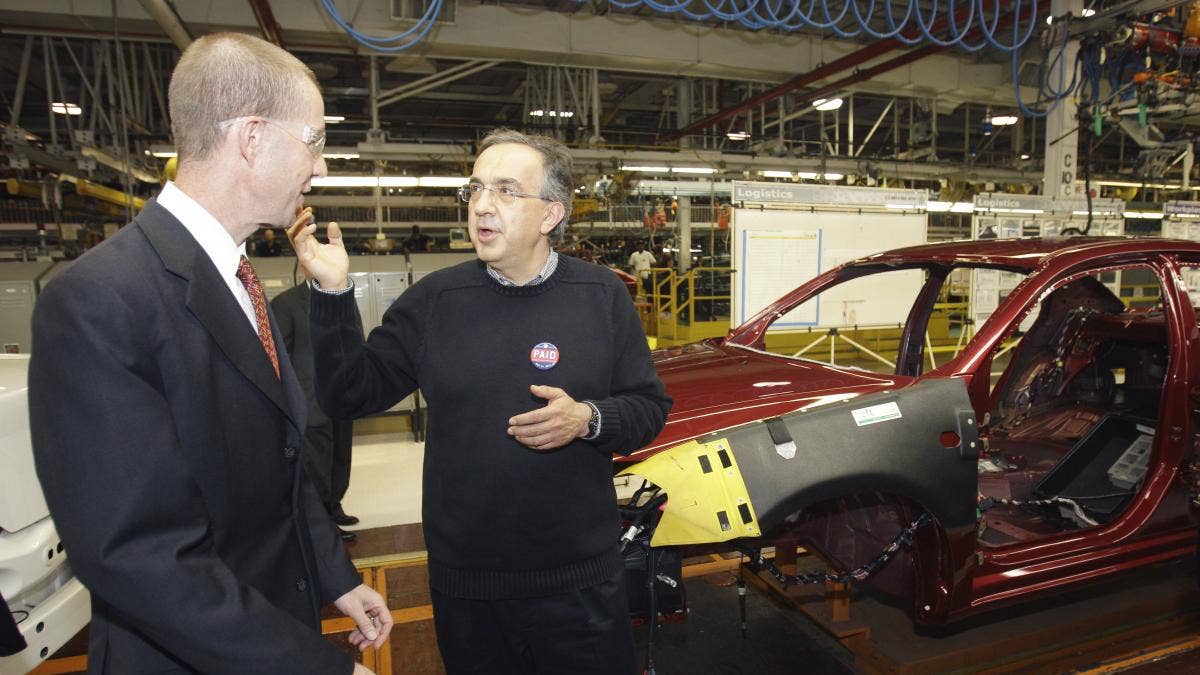
Chrysler Group CEO Sergio Marchionne, right, and Ron Bloom, assistant to President Obama for Manufacturing Policy walk on the assembly line at the Sterling Heights Assembly Plant in Sterling Heights, Mich., Tuesday, May 24, 2011. Marchionne acknowledged and expressed gratitude for the financial support from the U.S. and Canadian governments. (AP Photo/Carlos Osorio)
The White House Wednesday touted a resurgent U.S. auto industry as justification for a massive government auto bailout but also admitted taxpayers may still be on the hook for as much as $14 billion in losses from the deal.
"The latest number from the CBO, I think, was a $14 billion loss," said Ron Bloom, the Obama administration's lead manufacturing adviser. "And that reflects market prices at the time they did it. The final number will be the final number," Bloom continued. "[T]here is no joy ... in recognizing that all of this money will not be returned."
Still, Bloom says that amount is much less than originally feared when the federal government-over both the George W. Bush and Obama administrations--sank $80 billion into struggling auto makers. He says that the jobs saved and created outweigh taxpayer losses.
"[A]s we record what was lost, we need to also record what was saved," Bloom said. "External experts have stated that over a million jobs were saved by the president's actions, and other people have numbers substantially higher than that. The impact of the collapse of GM and Chrysler would not have been just the couple hundred thousand people who work at these companies."
But critics of the plan have long held that government intervention in private business creates a dangerous precedent that shouldn't have been set. Some even argue that bailouts like the one given GM have contributed to the stagnant unemployment rate that continues to plague the struggling economy.
"By rescuing GM, the government overrode market forces, and there are significant costs to assign for that," trade policy scholar Daniel Ikenson of the libertarian-minded CATO Institute wrote in a recent blog post. "Witness the stagnant economy with 9.6 percent unemployment."
"In the process of ‘saving' GM (which I still contend would have survived without the intervention and the number of jobs losses in the industry would have been comparable to the job losses that occurred anyway), the government inflicted huge costs on the economy..." he wrote.
But at Wednesday's White House press briefing, Bloom insisted the consequences of letting an American auto manufacturer go under would have been far greater than the slow economic growth the nation is currently experiencing. He defended the intervention and said the federal government wants to get out of the auto business soon by selling its remaining shares of stock in the manufacturers.
"The president made an extraordinary decision to intervene in the private economy," he said. "It was justified by the most severe economic downturn since the Great Depression. That is not the normal way that a government ought to behave toward private actors. And the longer you stay in, the longer you stay in, the more you signal to the market that the government intends to be in the business of owning companies."
Bloom wouldn't paint a rosy picture for the "Big Three" automakers as they move forward.
"The road ahead for these companies is not easy. It's not simple," Bloom said. "They live in a difficult environment of global competition. And so we by no means believe that their future is assured. On the other hand, we believe that the steps we took and the steps they took in partnership with us have positioned these companies to where they have a real chance of success."











































